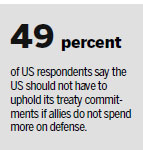US divided over NATO allies' defense spending
WASHINGTON - Nearly half of US citizens believe that the United States should not be required to defend NATO allies from attack if they do not spend more on defense, according to a Reuters/Ipsos poll conducted after US President Donald Trump's trip to Europe.
Washington's NATO allies have been shaken by Trump's harangue against them in Brussels over their underspending on defense.
A commitment to collective defense is the bedrock of the NATO alliance. It was founded in 1949 to contain the military threat from the Soviet Union. Its charter's Article V stipulates that an attack on one ally is an attack against all.

NATO diplomats have said they worry that Trump's portrayal of NATO as an alliance in crisis has raised concern that the US president's nagging criticism might erode US public support and risk Washington's commitment to collective defense.
In the poll, 49 percent of respondents said the US should not have to uphold its treaty commitments if allies do not spend more on defense.
Another 18 percent said they were not sure if the US had to uphold those commitments.
A third of those polled said they did not agree with the idea of linking Washington's treaty commitments to an increase in allies' military spending.
Two thirds of registered Republicans said the US should not have to uphold its treaty commitments, while almost four out of 10 Democrats held that view.
Trump lambasted allies for failing to meet a spending target of 2 percent of a country's economic output. He also has claimed that the US pays for 90 percent of European security, which NATO data shows is incorrect.
While US military spending makes up 70 percent of combined allied governments' military budgets, just 15 percent of US expenditure is spent in Europe on NATO-related defense.
The Reuters/Ipsos poll gathered responses from 1,011 registered voters throughout the US, including 453 Republicans and 399 Democrats. The poll has a credibility interval, a measure of precision, of 4 percentage points.
Rift with Turkey
Meanwhile, a Turkish court decided on Wednesday to keep a US pastor in jail, dashing hopes that he could be released during his trial on terrorism and spying charges, a case that has deepened a rift with NATO ally Washington. Andrew Brunson, who denies the charges, faces up to 35 years in jail if found guilty.
This is the third time his release has been refused - the court had in both previous hearings on April 16 and May 7 denied requests by the defense for him to be set free.
Trump later urged Turkish President Recep Tayyip Erdogan on Twitter to free the pastor.
Reuters - Afp
(China Daily 07/20/2018 page11)














